
JASON STARR is the international bestselling author of many crime novels, psychological thrillers and comics. His novels include Twisted City, Tough Luck, Hard Feelings, The Follower, Panic Attack, and Fugitive Red (published in the U.K. as Too Far). Additionally, he’s the author of the acclaimed Pack series of urban fantasy novels. His work in comics for Marvel and D.C. includes Batman, The Punisher, and the entire Wolverine Max series. He has also co-written several novels with Ken Bruen for Hard Case Crime, and is the writer of the official Gotham novels, based on the hit FOX series. Several of Starr’s novels are in development for film, TV and theater. He has won the Anthony Award twice, as well as the Barry Award. He lives in New York City, and his new book, FUGITIVE RED, is now available!
Visit Jason's website and order his books here.
Dave Watson: First, congratulations on a great new thriller. How did this one come about?
Jason Starr: Thank you! I started Fugitive Red several years ago and got sidetracked with other projects, including my previous novel Savage Lane, but I’d been eager to get back to this book. It’s always a good sign for me when I’m excited to work on something. I knew I could take the book in several directions, but I finally found the one that works best.
DW: You go back and forth between standalone thrillers, novels based on the Gotham TV series, and one based on Ant-Man. Does this require a lot of switching gears in storytelling? Is one more challenging than the other?
JS: I think they all present their own challenges. For the tie-in novels, I have to become an expert in the source material, but fortunately it’s fun and it never feels like “work.” Comics require a lot of visualization as opposed to novel writing where I’m absorbed, thinking about words. I find it energizing to switch back and forth between projects; it’s been a good way to keep things fresh.
DW: You also collaborate with Ken Bruen on an awesome series. Did you grow up reading pulp fiction or stories of that genre?
JS: I didn’t grow up in pulp fiction. Reading Mickey Spillane when I was a teenager was my first experience with crime fiction. I really got into the genre in college and throughout my twenties. I love film noir of the 40’s and 50’s, which got me to start reading the novels that were the subject matter for many of those movies, Chandler, Hammett, Cain, Highsmith, etc. and then I read much more of the genre. But movies were definitely my way in.
DW: I also take it you grew up in New York. It appears that the city has changed a lot since you started writing. Is that tough to keep up with?
JS: I don’t consciously think about this when I’m writing. I just try to write about the city as accurately as I can, from my own experience, without doing much research. I can look back at my books, though, and compare Cold Caller to Fugitive Red and see big differences in the way the city is portrayed. What I love about NYC is that it’s constantly changing—I’m not sure for the better or the worse; I try not to be judgmental.
DW: Fugitive Red and Savage Lane both have pivotal characters emerge part-way through the story, thinking the boyfriend in the former and the wife in the latter. Through the writing process, do you set out to do this or does it emerge while you're writing?
JS: Hmm, I guess that’s true, although both of those characters still appear fairly early on, in the first third of the books. Writing novels requires constant decision-making. When I’m plotting, I’m always asking myself—what creates the most suspense? I want to give the reader the minimum amount of information to keep the story moving forward. I try to make my decisions with this in mind, so if I can build anticipation by not revealing a character too soon, I always try to do that.
DW: Your novels also seem fertile for TV, streaming, and film mediums. If given the option, which medium do you think would work best for your stories? Your work uncovers layers of characters as the stories progress so long form comes to mind.
JS: It depends on the project. Currently I have a few novels in development for film and two for TV--The Follower and the Bust series. I see Fugitive Red as a movie, and I really want to adapt Savage Lane for TV.
DW: Finally, what is your favorite cinematic moment? [Note to Jason: this can be a scene, moment, shot, line that inspired you growing up or recently that inspired or has stuck with you to this day. I usually find and attach the clip].
JS: Hmm, so hard to pick just one. I immediately thought about DeNiro talking to the mirror in Taxi Driver, the end of Rudy, and the kid having a catch with his father in Field of Dreams. So you can see my interests go way beyond crime fiction.
Clip: Taxi Driver
Rudy
Field of Dreams
Dave Watson, founder and editor of Movies Matter, is a writer and educator in Madison, WI.

